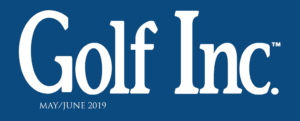At the start of the new year and in the spirit of planning, the thought leaders at GGA Partners sat down to predict what we believed to be coming throughout the year and shared our 2021 Predictions on the Shape of the Next Normal. Now, halfway through 2021 with the spring season in the books and summer underway, we reconvened GGA leaders for a mid-year check-in on predictions for the latter half of the year.
1. Ensuring fair and equitable access to amenities remains top of mind, especially on the golf course
A trending topic throughout the industry is golf’s demand surge and how long it will sustain, much has been written on this point and those who are closely watching rounds played metrics anticipate a clearer reading by the end of the summer.
Stephen Johnston, GGA’s founding partner, expects that private clubs will see the surge continue to elevate rounds played by members which will likely increase issues relating to compaction of tee traffic and accessibility. He predicts the benchmark regarding average number of rounds per member to be higher by approximately 10% following the pandemic and also increased golf course utilization by members’ spouses and family members. Both factors will create a greater demand for tee times at private clubs.
Johnston believes some clubs may need to consider permitting round play by fivesomes instead of foursomes, potentially catalyzing logistical challenges such as a greater need for single-rider power carts in order to maintain speed of play at the same rate as foursomes with all players using power carts. For club managers and course operators, this entails an increased need for current and detailed evaluation of the benefits of membership and the relationship between playing privileges and the practical ability to book a tee time and get on-course.
2. Effective demand management is key and will shift from agile, flexible approaches to new operating standards as demand stabilizes
During the pandemic and throughout 2020, many golf, club, and leisure businesses recognized the increased need to more accurately and routinely measure the utilization of amenities, adapting operations management to react quickly to change.
Craig Johnston, head of GGA’s transaction advisory practice, anticipates an evolution in this one-day-at-a-time, agile monitoring approach into a new and more formalized standard of operating procedures. “At the start of 2021, we said we would see clubs provide flexibility and experiment with various operational changes,” he explained. “With the pandemic feeling like it’s steadily moving toward the rear-view mirror, members will be expecting clubs to begin instituting the ‘new normal’ operations and the data compiled by clubs in the first half of the year will be critical to deciding on the new normal.”
Johnston believes that membership demand will continue to be strong through the second half of the year and that it is likely utilization will reduce marginally as members begin travelling again for work and social obligations. Even with a marginal reduction in utilization, demand for private club services will remain strong and will continue to put pressure on capacity and access in most clubs.
Senior Partner Henry DeLozier encourages club and facility operators to embrace short-term continuations of high demand while keeping an eye on the future and the non-zero probability of a demand shift in the coming years. “Clubs must create pathways to sustain demand while navigating utilization volume. It is unwise to place hard or irreversible limitations on capacity while clubs are at historic maximums for demand and usage,” cautioned DeLozier. “Clubs will do well to establish a clear understanding of demand and utilization to enable innovative programs which serve to fill periods of low demand in the future.”
3. Ongoing uncertainty about the pandemic’s long-term impact on club finances will increase the review and reevaluation of club financial projections to ensure sustained budget flexibility
While data regarding utilization, participation, and engagement throughout the summer months continues to be captured and consolidated, business leaders should not delay their financial planning and instead get to work on reevaluating finances and updating their future forecasts.
“Now is the time to review, evaluate, and reset club debt levels,” emphasized Henry DeLozier. “Clubs need to recast financial projections based upon elevated joining/initiation fees arising from high demand.”
In support of alacrity in financial planning, DeLozier notes that labor shortages spurred by the pandemic will increase payroll-related costs at a material level. He also predicts that comprehensive risk review is needed at most clubs to evaluate possible impacts arising from cyber-crime and/or declining club revenues during 2022.
Beyond internal shake-ups in utilization or operations, club leaders should be anticipating external impacts that could impact their financial plans. A hypothetical example raised by DeLozier is if the U.S. economy were to become more inflationary. In such a circumstance he believes clubs would see an increase in the costs of labor and supplies which would necessitate increases in member dues and fees, a deceleration of new-member enrollments as consumer confidence dips, and a slight slow-down in housing demand.
Right now, uncertainty remains with respect to the virus as well as the resulting economic impact from the pandemic. From a financial standpoint, clubs will do well to advance their forward planning while retaining budget elasticity. “It will be imperative for clubs and boards to build flexibility into their budgets and agility into their operations,” added Craig Johnston.
4. Existing governance practices, policies, and procedures will be revisited, refurbished, and reinvigorated
A litany of new ways of operating and governing the club arose as a result of the pandemic, some of which suggest an efficacy that can be sustained in a post-pandemic environment. Essential to assimilating these adaptions into new standards of procedure is a review of existing governance practices and the documentation which supports them.
“At a time when boards can measure the full range of financial performance metrics, updating club governing documents is a primary board responsibility,” noted Henry DeLozier. “Board room succession planning must be formalized to prepare clubs for the inevitable downturn from record high utilization.”
In considering the nearly overnight adoption of technology tools to enable remote meetings and board-level deliberations, partner Michael Gregory noted a substantial increase in the use of technology tools that go beyond virtual Zoom meetings. “The pandemic has allowed clubs to test online voting,” he explained. “For many clubs, once things return to normal, their bylaws won’t allow for the continued execution of online voting unless they make changes.”
“We have seen the adoption and implementation of online voting to be a huge success for the clubs who have tried it for the first time,” said Gregory. “Members love it, it’s easy, it’s convenient, it leads to higher participation from the membership, and many clubs are in the process of changing their governing documents to allow for online voting as a result.” The challenges and opportunities of employing online voting are detailed in our piece on taking club elections digital, which features a downloadable resource that can be shared among club boards.
5. In human resources, expect to see deeper reevaluations of compensation structures and employee value propositions
Weighing in from across the pond, Rob Hill, partner and managing director of GGA’s EMEA office in Dublin, predicts that club leaders will face bigger challenges in human resources throughout the remainder of 2021.
The first of three particular items he called out is a reevaluation of compensation. “Making decisions about employee pay is among the biggest challenges facing club leaders in the wake of the coronavirus shutdown,” stated Hill. “As they begin compensation planning for the rest of the year and into 2022, these leaders not only have to consider pay levels, but also the suitability of their mission and operating model to thrive in a post-pandemic world.”
Citing his recent experiences in the European market, Hill shared that club leaders are challenged with finding new ways to operate smarter and more efficiently, while also looking for innovative ways to implement sturdy, low-cost solutions that their employees will love. Which leads to his second point, that there will be a renewed emphasis on what employees love and how clubs, as employers, can provide an enhanced value proposition for their employees.
“As employees get back to work onsite, employers are finding that what their people value from the employment relationship has changed,” Hill explained. “Where pay has been viewed as largely transactional in the past, clubs may need to provide new types of benefits, especially programs that provide more flexibility, financial security, and empowerment to retain and motivate their people.”
Lastly, there is likely to be considerable movement of talent over the coming year brought on by employees’ new work-life ambitions and financial imperatives, said Hill, “As demand for their skills and experience grows, the very best talent will seek out employers that demonstrate they view employees not as costs but as assets and reflect this in their approach to compensation.”
Recalling our start-of-year prediction that the movement of people and relocation of companies will reshape markets, partner Craig Johnston added, “The relocation of people continues to be a prominent trend and one that is likely to continue in the second half of the year.” For club employers, it’s not just the changing physical locations which impact the cost and supply of labor, but also the expectations of employees as they seek out competitive new roles and work experiences.
6. The repurposing and reimagining of club facilities, amenities, and member-use areas will continue
The pandemic pushed to the fore the need for clubs to adapt their facilities to match changes in the ways members use and enjoy their clubs. A combination of practical evolutions for health and safety and circumstantial evolutions drawn from widespread ability for members to work remotely created increased desire for clubs to offer more casual outdoor dining options and spaces to enable members to conduct work while at the club.
Partner Stephen Johnston believes these sentiments will continue to near-term facility improvements at clubs. “With more flexibility in the workplace and members working from home periodically, there will be a need at the club for members to do work or take calls before their tee time or their lunch date,” he said. “It has been evident for some time that members generally prefer to enjoy outdoor dining and since, throughout the pandemic, it has become apparent that guests draw greater comfort in outdoor experiences, I see a greater demand for outside patio and food and beverage service.”
As society begins to reopen and communities begin to stabilize, time can only tell precisely how clubs will continue to evolve their operations, whether that be scaling back pandemic-relevant operations or doubling-down on new services and efficiencies. Evident in our work with clients are significant efforts to reorganize club leaders, reevaluate operations, and retool plans for a successful future in the new normal. Here are a few highlights of efforts clubs are making for the next normal:
- Reinvigoration of governance processes and engagement of leaders to ensure alignment between boards and club strategic plans.
- Renewed surveying of members to keep a pulse on how sentiments have changed from pre-pandemic, during pandemic, and currently as communities stabilize.
- Enhanced adoption and application of electronic voting as clubs reevaluate membership structures, governing documents, and operating policies amidst “displaced” members.
- Reconfiguring of budgets, capital plans, and long-range financial models.
- Refinement and advancement of membership marketing strategies, tactics, and materials.
- Tightening relationships between facility planning, capital improvements, and member communications campaigns.




